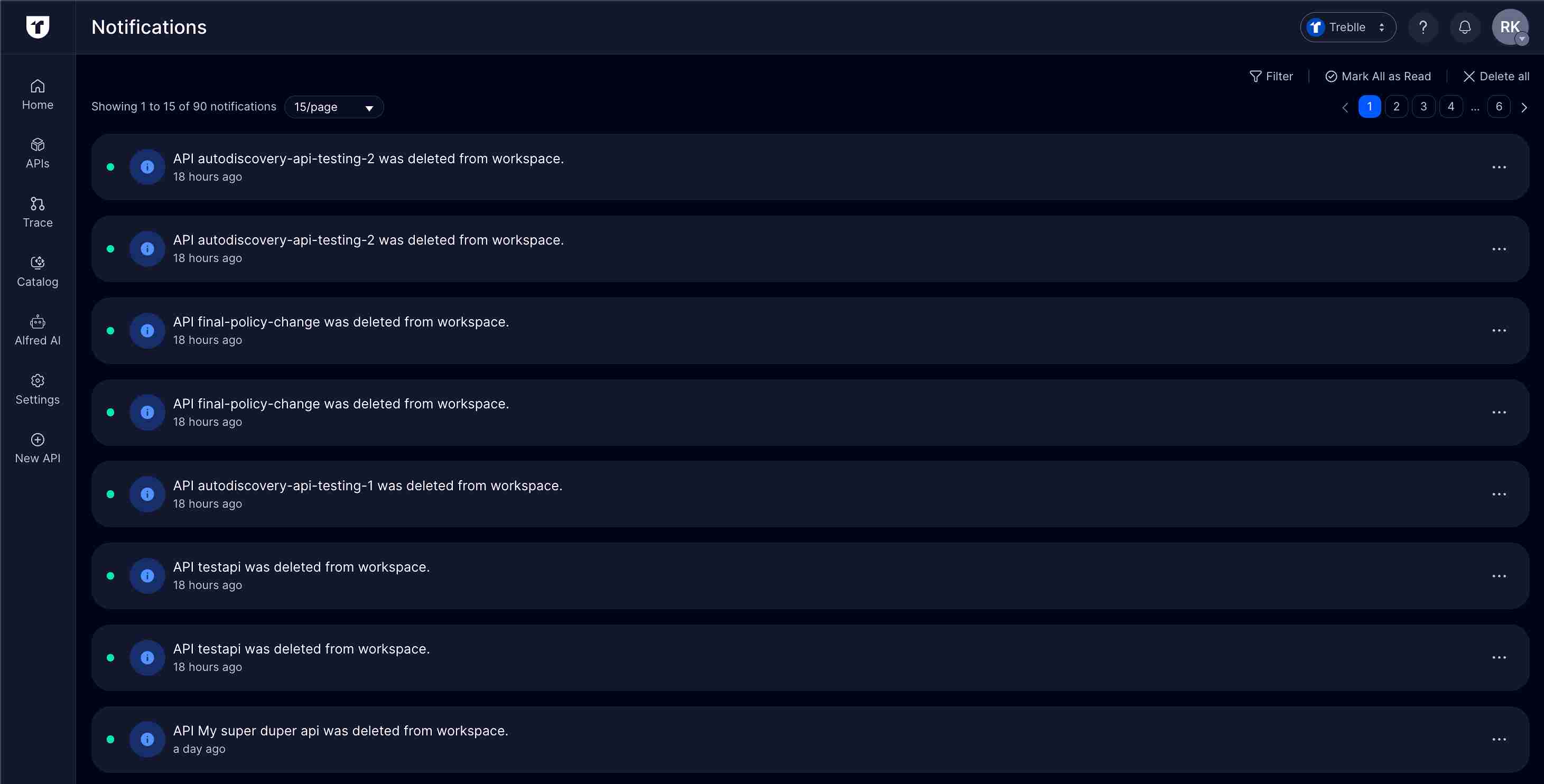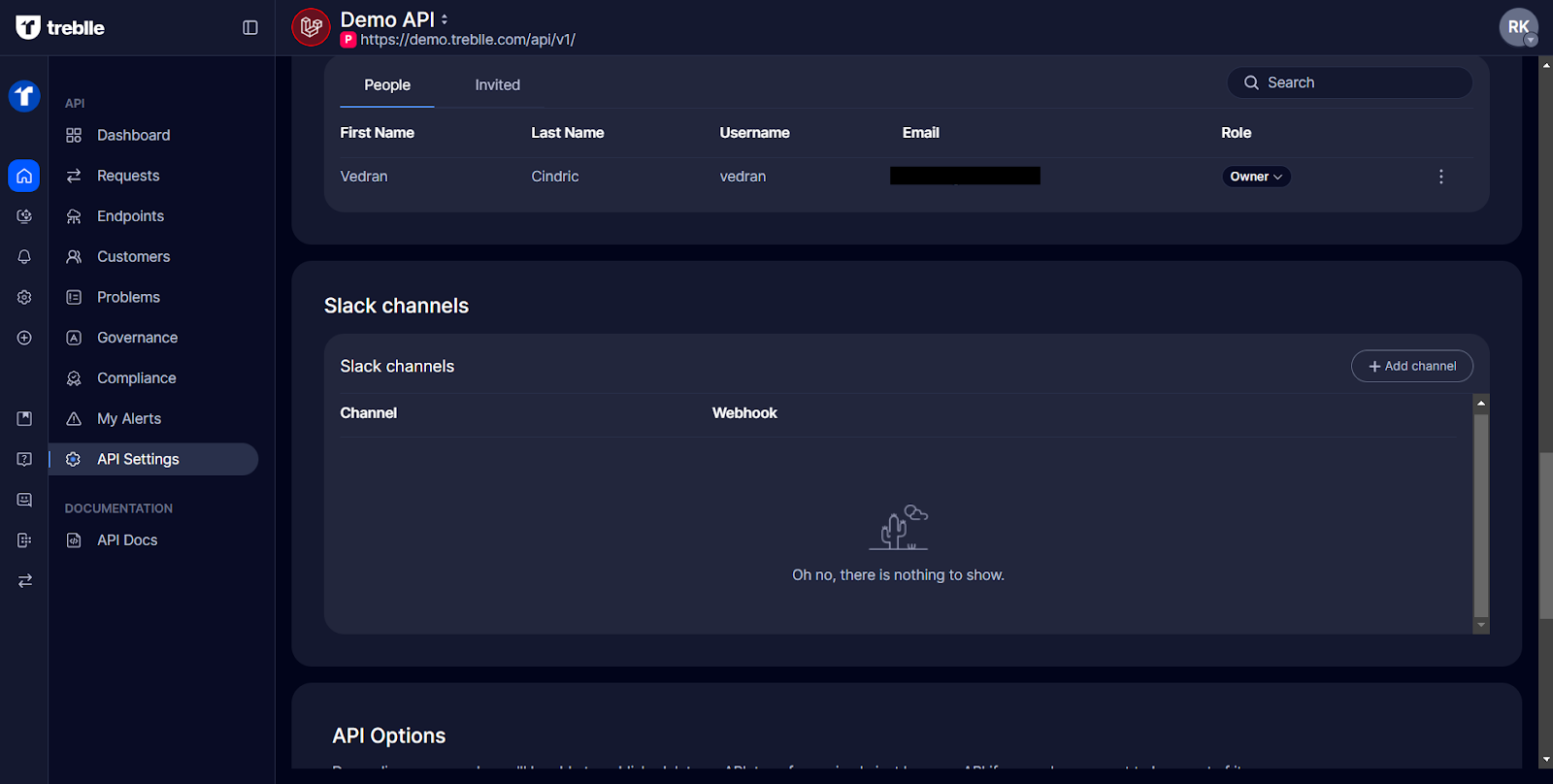Default Alerts
Treblle provides a comprehensive notification system that delivers intelligent alerts and real-time updates across multiple channels, designed to keep users informed without overwhelming them.
Default Notifications are system-level alerts that are automatically enabled for all users with smart defaults to ensure you never miss critical information about your APIs and account.
API & Workspace Notifications
Stay informed about important changes to your API landscape and team collaborations.
API Management Alerts
- New API additions: Notifications when new endpoints or features are added to your APIs
- API deletions/deprecations: Critical notices about discontinued services or deprecated endpoints
- Configuration changes: Updates to API settings, authentication methods, or access controls
Team Collaboration
- Member additions: Alerts when new team members join workspaces or projects
- Workspace invitations: Notifications for invites to collaborate on new workspaces or APIs
- Permission changes: Updates when user roles or access levels are modified
Performance Monitoring
- Error limit notifications: Automatic alerts when API error rates spike or approach critical thresholds (>50% error rate)
- Performance degradation: Warnings when response times exceed normal baselines
- Unusual traffic patterns: Notifications about unexpected spikes or drops in API usage
System Status Notifications
Receive real-time updates about Treblle platform health and scheduled maintenance.
Service Health
- Service disruptions: Real-time alerts for outages or degraded performance affecting the Treblle platform
- Maintenance windows: Advance notifications about scheduled downtime and maintenance activities
- Performance updates: Information about platform improvements and optimizations
Security Alerts
- Security updates: Important security patches and platform updates
- Breach notifications: Immediate alerts about any security incidents (though Treblle maintains industry-leading security standards)
- Compliance changes: Updates about regulatory compliance features and requirements
Account & Billing Notifications
Keep track of your account status and subscription details with automated billing alerts.
Payment Management
- Payment failures: Immediate notifications for failed transactions or expired payment methods
- Subscription changes: Confirmations for plan upgrades, downgrades, or renewals
- Invoice availability: Alerts when new invoices are generated and available for download
Usage Monitoring
- Usage thresholds: Proactive warnings when approaching plan limits or quota restrictions
- Overage notifications: Alerts if usage exceeds current plan allowances
- Plan recommendations: Suggestions for plan changes based on usage patterns
Notification Channels
Default alerts are delivered through multiple channels to ensure you receive critical information:
In-App Notifications
-
Dashboard alerts: Visual indicators within the Treblle platform
-
Notification center: Centralized location for all recent alerts and updates
-
Status badges: Real-time status indicators for APIs and services

Email Notifications
-
Immediate alerts: Critical notifications sent instantly via email
-
Daily summaries: Consolidated daily reports for non-urgent updates
-
Weekly reports: Comprehensive weekly summaries of API health and performance

Browser Notifications
-
Real-time alerts: Push notifications for urgent issues when using the Treblle platform
-
Permission-based: Opt-in browser notifications for immediate awareness

Managing Default Alerts
While default alerts are automatically enabled with smart settings, you have control over your notification preferences:
Alert Frequency
- Immediate: Real-time notifications for critical issues
- Batched: Grouped notifications to reduce notification fatigue
- Digest format: Summary reports at scheduled intervals
Severity Levels
- Critical: Immediate attention required (service outages, security issues)
- High: Important but not urgent (error rate spikes, performance issues)
- Medium: Informational updates (new features, team changes)
- Low: General notifications (usage reports, maintenance schedules)
Customization Options
While these are default system alerts, you can:
- Adjust notification timing and frequency
- Choose preferred communication channels
- Set up additional custom alerts for specific scenarios
- Create team-specific notification rules
For more advanced notification customization, see our Custom Alerts documentation.